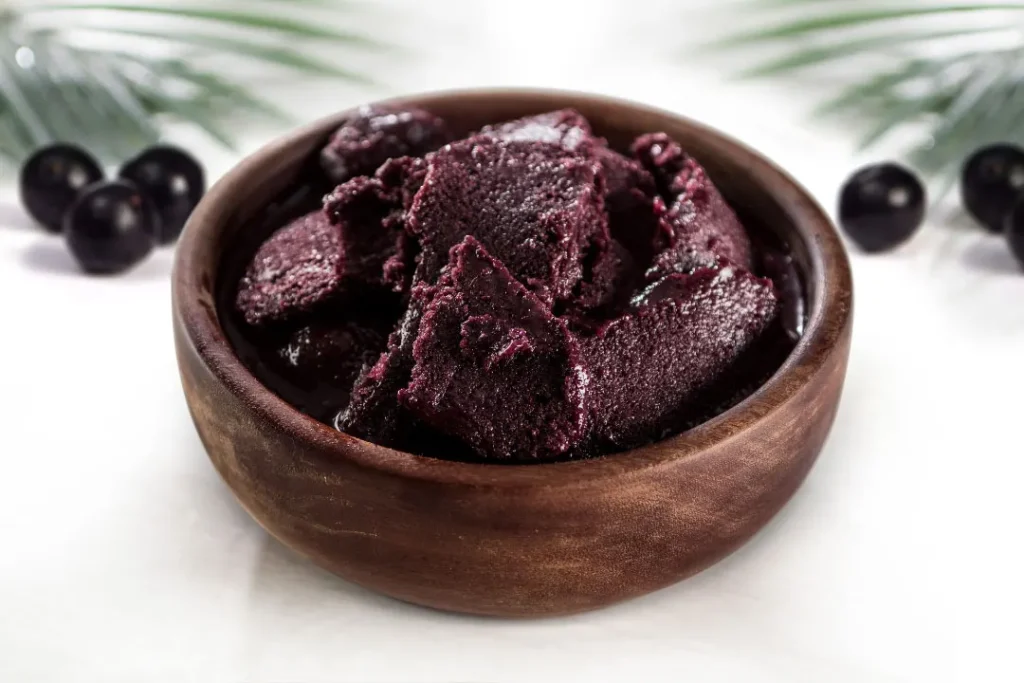The acai (Euterpe oleracea) fruit is endemic to Central and South America, primarily in the Amazon jungle. Acai has grown in popularity as a nutritional supplement, owing to its high concentration of antioxidants, fiber, good fats, and vitamins. This article examines the nature of acai, its health benefits, ideal dosage, adverse effects, potential substance interactions, and the responsible use of this dietary supplement. We’ll also go into the technical intricacies of acai’s chemistry and the physiological methods by which it affects the body and brain.
You May Also Like:
DELTA BrainLuxury™ Wins Best Sleep Support Supplement Product
Key Ingredients In Mushroom Supplements: Active Agents For Your Health
Nature of Acai
Acai is a tiny, dark purple fruit that grows on the palm tree Euterpe oleracea. The seed of acai is surrounded by a thin layer of edible pulp in the fruit. Acai has a distinguished high profile of polyphenols which are responsible for its antioxidant capabilities. Acai also contains a lot of fiber, monounsaturated fatty acids (like oleic acid), important amino acids, and vitamins A, C, and E.

Health Benefits of Acai
- Antioxidant Capacity: Acai has a high antioxidant capacity, which has been related to the presence of anthocyanins and other polyphenols. These substances aid in the neutralization of free radicals and the lowering of oxidative stress and inflammation. As a result, the risk of developing chronic diseases is reduced.
- Cardiovascular Health: Acai may benefit cardiovascular health by encouraging healthy lipid levels. Acai consumption has been proven in studies that can drop total and LDL cholesterol levels and increase HDL cholesterol levels. Acai may also lower blood pressure, lowering the risk of atherosclerosis and other cardiovascular disorders.
- Weight Management and Metabolic Health: Owing to its high fiber content and potential appetite-regulating effects, acai consumption has been linked to better weight management and metabolic health. Fiber supports proper digestion, decreases energy intake, and increases satiety, all of which contribute to weight loss and maintenance. Acai polyphenols may also increase glucose metabolism and insulin sensitivity, lowering the risk of type 2 diabetes.
- Neuroprotection: Because of its antioxidant and anti-inflammatory characteristics, acai may have neuroprotective benefits. Acai has been demonstrated in animal experiments to minimize cognitive loss associated with aging. Thus, acai can protect you against neurodegenerative disorders such as Alzheimer’s and Parkinson’s.

Chemistry of Acai
Acai’s antioxidant capabilities are mostly due to the presence of polyphenols, specifically anthocyanins. These chemicals are responsible for the deep purple color of the fruit and can account for up to 10% of its total weight. Acai is reported to have a higher polyphenol concentration than other regularly consumed fruits such as blueberries, raspberries, and cranberries.
Anthocyanins are water-soluble pigments that are members of the flavonoid family. They have strong antioxidant and anti-inflammatory characteristics, which are thought to contribute to acai’s health advantages. Anthocyanins have a flavonoid backbone with an attached sugar molecule as their chemical structure. The particular composition and concentration of anthocyanins in acai may vary depending on where and when it is harvested, as well as how it is processed.
Physiological Mechanisms of Action of Acai
- Antioxidant and anti-inflammatory Effects: As previously mentioned, acai polyphenols, especially anthocyanins, have antioxidant and anti-inflammatory properties. The polyphenols work by scavenging free radicals, lowering oxidative stress, and regulating pro-inflammatory signaling pathways. Hence, acai is believed to reduce the risk of chronic diseases such as cardiovascular disease, diabetes, and some malignancies.
- Cardiovascular Effects: Acai may benefit cardiovascular health by encouraging healthy lipid profiles, lowering inflammation, and increasing nitric oxide production. Nitric oxide is a chemical that relaxes the smooth muscles of blood arteries, hence regulating blood flow and blood pressure. Acai polyphenols may increase nitric oxide generation, resulting in better vascular function and lower blood pressure.
- Metabolic benefits: Acai’s high fiber content and potential hunger regulation may help with weight management and metabolic health. Fiber supports proper digestion, decreases energy intake, and increases satiety, all of which contribute to weight loss and maintenance. Polyphenols in acai also lower the risk of type 2 diabetes by increasing glucose metabolism and the sensitivity of your body toward insulin.
Neuroprotective Effects: Acai has neuroprotective effects which have been demonstrated in animal experiments. It is shown that acai can minimize cognitive loss and protect against neurodegenerative disorders such as Alzheimer’s and Parkinson’s.

Optimal Dosage of Acai
Acai dosage is difficult to determine due to limited human research and the variety in acai product composition. According to studies, taking 100-200 grams of acai pulp per day may bring considerable health benefits. Individual responses to acai supplementation may vary, thus consulting with a healthcare expert before beginning an acai supplementation regimen is recommended.
Side Effects of Acai
When ingested as part of a well-balanced diet, acai is usually regarded as safe. Some people may develop moderate side effects such as stomachache, bloating, or allergic responses. These negative effects are usually caused by excessive use or sensitivity to acai’s components. Acai should be avoided by people who have pollen allergies or a history of allergic responses to other fruits.

Potential Substance Interactions with Acai
- Medications for Anticoagulation and Antiplatelet Function: Acai may interact with anticoagulant and antiplatelet medications, increasing the risk of bleeding. The high vitamin K content of acai may counteract the effects of anticoagulant medicines like warfarin. When used with antiplatelet drugs such as aspirin and clopidogrel, acai may suppress platelet aggregation, thus raising the risk of bleeding. Individuals who are taking these medications should contact their doctor before integrating acai into their diet.
- Hypoglycemic drugs: Acai can interact with hypoglycemic drugs, resulting in dangerously low blood sugar levels. Before ingesting acai, diabetics should regularly monitor their blood sugar levels and talk with their healthcare physician.
- Antihypertensive drugs: Acai has been shown to amplify the effects of antihypertensive drugs which can result in low blood pressure that may be detrimental. Before consuming acai, anyone taking antihypertensive drugs should see their healthcare professional.
Best Responsible Use of Acai
- Select High-Quality Products: Choosing high-quality acai products is critical for achieving the best possible health effects. Look for items that are made entirely with acai, with no additional sweeteners, tastes, or preservatives. Choose organic and sustainably sourced acai to reduce your exposure to pesticides and environmental toxins.
- Follow Dosage Guidelines: Consuming 100-200 grams of acai pulp per day is generally considered safe and healthy for the majority of people. However, before beginning an acai supplementation plan, if you have any pre-existing health issues or are taking any prescriptions, you should contact a healthcare expert.
- Include Acai in a Balanced Diet: Acai should be included in a balanced diet that includes a range of fruits, vegetables, complete grains, lean protein sources, and healthy fats. It is not advisable to rely only on acai or any other single meal for good health.

Acai: Conclusion
Just like any other common berries, acai berries contain a high concentration of antioxidants. In fact, the antioxidant content of acai berries is higher than cranberry, raspberry, blackberry, strawberry, and blueberry. Polyphenols can be easily found in acai berry and it contributes to the deep purple color and the strong antioxidant and anti-inflammatory properties. Hence, acai supplements can help to effectively reduce oxidative stress which can promote good cardiovascular health. However, inappropriate usage of acai supplements may lead to unwanted effects and hence advice from doctors is highly recommended. It is also advised that you purchase a superior acai supplement from a trustworthy seller to ensure its quality.
References:
- Antioxidant capacity and Other Bioactivities of the Freeze-dried Amazonian Palm berry, Euterpe oleraceae mart. (acai). Link: https://pubs.acs.org/doi/abs/10.1021/jf0609779
- Acai (Euterpe oleracea Mart.) in Health and Disease: A Critical Review. Link: ncbi.nlm.nih.gov/pmc/articles/PMC9965320/
Important Note: The information contained in this article is for general informational purposes only, and should not be construed as health or medical advice, nor is it intended to diagnose, prevent, treat, or cure any disease or health condition. Before embarking on any diet, fitness regimen, or program of nutritional supplementation, it is advisable to consult your healthcare professional in order to determine its safety and probable efficacy in terms of your individual state of health.
Regarding Nutritional Supplements Or Other Non-Prescription Health Products: If any nutritional supplements or other non-prescription health products are mentioned in the foregoing article, any claims or statements made about them have not been evaluated by the U.S. Food and Drug Administration, and such nutritional supplements or other health products are not intended to diagnose, treat, cure, or prevent any disease.


